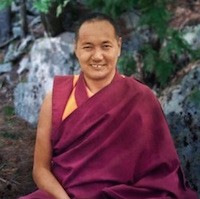People often talk about spirituality and materialism, but what do these terms really mean?
Actually, this is not a simple subject; it’s vast. There are probably countless points of view as to what spirituality and materialism truly are.
On the surface, we might agree, “This is spiritual; that is material,” but if you look into it more deeply I think you’ll find that as individuals, each of us has a different view.
Some people think that spirituality and materialism are complete opposites—two irreconcilable extremes—and that it’s impossible to be spiritual and materialistic at the same time. Others consider that those who seek the spiritual path do so only because they are unhappy with their lives, have failed in the material world and can’t find a way to be happy in it, can’t face living in normal society and therefore hallucinate that somewhere up there, there’s a God in whom they can believe.
 Another common misconception is that if you are a spiritual seeker you must abandon all material comfort; that you can’t enjoy both together.
Another common misconception is that if you are a spiritual seeker you must abandon all material comfort; that you can’t enjoy both together.
This kind of superficial contradiction is all too common amongst the people of this Earth—“If it’s this, it cannot be that; if it’s that, it cannot be this.” Should a spiritual practitioner be wealthy, people will say, “How can you be so rich? You’re supposed to be spiritual.” This kind of philosophical judgment shows a complete lack of understanding of what spiritual and materialistic really are.
My point of view is that all such interpretations are wrong conceptions; too extreme; they are fixed ideas.
Furthermore, there are those who say, “You’re a spiritual practitioner? You must be a believer. I don’t believe anything.” However, a few simple questions will show that they have more beliefs than most religious people. Belief is not simply intellectual. As long as you have attachment to ideas, material things or projections of good and bad, in my view, you’re believer. When you say, “I don’t believe anything,” it’s just not true. Belief isn’t only the fear that up there in the sky is a God who controls and will punish you. If you really check up on the human mind, you’ll never find anyone who believes nothing. It’s impossible. As long as people have attachment to anything and ideas of good and bad, as far as I’m concerned, they’re believers.
Really wise religious people do not hold extreme beliefs, such as the hallucination that they’re under the control of some energy force up there. Therefore, do not think that those who seek the spiritual path are all hallucinating, extreme believers. What they are depends on how they understand the nature of the path they are following.
Of course, I know that some people, especially those brought up in the West, can have a materialistic attitude towards the spiritual path. The moment they hear about Buddhism or some other religion, they are immediately attracted to it. Without understanding the religion or checking that it suits their basic nature, they grasp at it right away: “Oh, this is fantastic.” That’s extreme. It’s also very dangerous.
From my point of view, that’s not a spiritual attitude. Just because you love some idea doesn’t mean that you understand it or that you are able to practice or experience that philosophy. You can label any idea as good, but if it has no influence on your daily life, how can you say, “I love that idea; I’m spiritual.” That’s ridiculous.
All such attitudes are very dangerous. Spiritual practitioners have to be realistic about their everyday lives instead of hallucinating—“I am Jesus, look at me”; “I am Buddha, look at me”—holding exaggerated views and complete misconceptions of their own reality that have nothing to do with any religion.
Religion is not just some dry, intellectual idea that appeals to you. Rather, it should be your basic philosophy of life; something that through experience you have found relates positively with the energy of your psychological makeup. If you hear an idea that seems to make sense, first see if you can get a taste of it through experience. Only then should you adopt it as your spiritual path.
Say you encounter Buddhist philosophy for the first time: “Oh, fantastic. This is so good.” Then, because you regard these new ideas materialistically, you try to make radical changes to your everyday life. You can’t do it; it’s impossible. You can only change your mind gradually. To actualize Dharma you have to start from where you are and base any practice that you do on that foundation. But to abandon your basic nature and try to change yourself according to some fantastic idea, as if you were changing clothes—that’s really hallucinating. That’s too extreme. People who do that have no understanding of the nature of the spiritual path. That’s dangerous. You check up; we tend to judge things very superficially.
As I said, if we were to ask ourselves what is the nature of spirituality and what is the nature of materialism, we’d all come up with different answers. There would be no unanimous conclusion. This is because we all think differently and we’ve all had different life experiences. Even if you show a group of people some unknown material substance and ask them to identify it, they do so on the basis of their previous experiences and may come up with many different answers. For similar reasons, we all reply differently when we’re asked to define the religious and the materialistic life.
 My point of view is that following a spiritual path does not automatically mean that you have to reject material things and leading a materialistic life does not necessarily disqualify you from the spiritual. In fact, even if you are materialistic, if you really check deep within your own mind’s nature, you’ll find that there’s a part of it that is already religious. Even if you declare, “I’m not a believer,” nevertheless, within your mind the religious dimension is there. It may not be intellectualized, it may not be your conscious philosophy, but there’s a spiritual stream of energy constantly running through your consciousness. Actually, even the intellectual and philosophical aspects of religion are also there in your psyche, but they have not come from books or papers; they have always been there. So be careful. Your extreme views may interpret that spirituality and materialism are completely contradictory, but they are not.
My point of view is that following a spiritual path does not automatically mean that you have to reject material things and leading a materialistic life does not necessarily disqualify you from the spiritual. In fact, even if you are materialistic, if you really check deep within your own mind’s nature, you’ll find that there’s a part of it that is already religious. Even if you declare, “I’m not a believer,” nevertheless, within your mind the religious dimension is there. It may not be intellectualized, it may not be your conscious philosophy, but there’s a spiritual stream of energy constantly running through your consciousness. Actually, even the intellectual and philosophical aspects of religion are also there in your psyche, but they have not come from books or papers; they have always been there. So be careful. Your extreme views may interpret that spirituality and materialism are completely contradictory, but they are not.
Read more from Lama Yeshe’s The Peaceful Stillness of the Silent Mind, a series of lectures given in Australia in 1975. Edited by Nicholas Ribush. Freely available from the Lama Yeshe Wisdom Archive.
Love elephant and want to go steady?
Sign up for our (curated) daily and weekly newsletters!
Author: Lama Thubten Yeshe
Editor: Renée Picard
Photos: All photos courtesy of the Lama Yeshe Wisdom Archive
Ready to join?
Hey, thanks so much for reading! Elephant offers 1 article every month for free.
If you want more, grab a subscription for unlimited reads for $5/year (normally, it's $108/year, and the discount ends soon).
And clearly you appreciate mindfulness with a sense of humor and integrity! Why not join the Elephant community, become an Elephriend?
Your investment will help Elephant Journal invest in our editors and writers who promote your values to create the change you want to see in your world!
Already have an account? Log in.
Ready to join?
Hey, thanks so much for reading! Elephant offers 1 article every month for free.
If you want more, grab a subscription for unlimited reads for $5/year (normally, it's $108/year, and the discount ends soon).
And clearly you appreciate mindfulness with a sense of humor and integrity! Why not join the Elephant community, become an Elephriend?
Your investment will help Elephant Journal invest in our editors and writers who promote your values to create the change you want to see in your world!
Already have an account? Log in.
Ready to join?
Hey, thanks so much for reading! Elephant offers 1 article every month for free.
If you want more, grab a subscription for unlimited reads for $5/year (normally, it's $108/year, and the discount ends soon).
And clearly you appreciate mindfulness with a sense of humor and integrity! Why not join the Elephant community, become an Elephriend?
Your investment will help Elephant Journal invest in our editors and writers who promote your values to create the change you want to see in your world!
Already have an account? Log in.
 Share on bsky
Share on bsky






Read 0 comments and reply